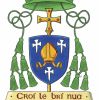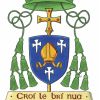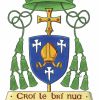Church of St. Michael the Archangel, Analeenta, Mourneabbey Parish
Celebrant Bishop William Crean
Bishop Pádraig O Donoghue was called to his eternal reward shortly before 9 am on Sunday morning past. Those aware of his weakening health knew it could not be long more. When the news filtered through, it was mixed emotions – one could only be happy for him who laboured in the vineyard of the Lord to now be entering the moment promised him in baptism. For those who knew him, or knew of him, it is difficult not to feel the loss of a fearless defensor Fidei. If anything defined him, it was his living relationship with Jesus Christ. Never in your face, but utterly transparent and enthused by the Good News of the Gospel. Always reaching out, always pushing the boundaries, always pressing for new spheres of influence in the mission to share the truths of the Catholic faith.
He came in many guises of course. Among those whom he ministered to in the Archdiocese of Westminster and in Lancaster, he was Bishop Patrick or Pat. He tended to use the Gaelic form Pádraig more locally. Finally, it was his great mentor Cardinal Basil Hume who affectionately dubbed him P o D – POD. I never could fully ascertain whether he was keen on that or not! Whatever about the moniker, his bond with the Cardinal was formative. He spoke of Basil Hume in the warmest of terms. He used to say: “my great friend, Cardinal Hume.” Bishop Pádraig recently said that Cardinal Hume “regarded support of his priests as his primary duty and the support of young people in his church as a particular responsibility and priority.” In a very telling comment, Pádraig said that Cardinal Hume’s “genuine holiness and easy approach drew many people to the Cathedral.” There is so much of Bishop Pádraig himself reflected in those remarks.
Of this day, his funeral Mass, Bishop Pádraig spoke frequently. He used to say to his family – “my funeral will be a big affair, you know. There will be quite a few dignitaries present. Whatever ye do, make sure to feed them well.” He laughed easily and heartily – a wonderful mark of any human being.
And so, we find ourselves here today in his beloved Mourneabbey to afford him the dignity of Christian burial. Would that circumstances were different,our mode of celebration would certainly match! Nonetheless, the holy sacrifice of the Mass is today being offered for his soul, and we pray he is being born into eternal life. This is what truly matters in this moment: united in our prayers, in our profession of the resurrection of the dead and in our celebration of Holy Mass for his soul. People from all over the globe are joining us at this moment not least his family in the States and beyond. Our role in today’s Holy Mass is to participate as worthily as we can from where we are, and to pray for Pádraig’s dear soul.
His death very fittingly dovetailed with the Sunday of the Word of God. Pádraig loved to preach and teach the Word of God. His homilies were rarely short, it must be said, but brimming over with his love for Jesus and his Church. Today we gather on the memorial of Saints Timothy and Titus, both of whom were Bishops as he was. Our second reading and our Gospel come from this memorial. Our first reading comes from the Book of Daniel. It is the vision of Michael the archangel at the time of great reckoning and distress unparalleled since nations first came into existence.
Today’s Mass takes place in the Church of St Michael the Archangel in his beloved Mourneabbey. Pádraig was baptised here as a baby, confirmed here and, on 25th May 1967 ordained to the priesthood for the Archdiocese of Westminster. He was 33 years old. Pádraig brought untold resources of energy and affability to all he set out to accomplish. His various apostolates are well documented leading to him being appointed auxiliary bishop of Westminster in 1993. As his responsibilities increased, so did his public profile and he conducted himself with valour, eking out a name for himself as a man of substance. It was in 2001 when, at the age of 69, his move to Lancaster occurred and he began to really find his voice as a diocesan bishop – some even dubbing him the prophet of the north for his fearless engagement with vested interests, religious indifferentism and cultural and social depravities. In human terms, it is difficult to underestimate the emotional impact on Pádraig personally of being wrenched out of London, as he was, after over 40 years of his life had been spend there to good effect. That said, it was as if Lancaster was waiting and in need of his practical wisdom and fearless determination to serve God’s people as their shepherd and pastor.
Pádraig was a priest who prayed without fail and, consequently, his bond with Jesus was bulletproof. As a small boy attending the local school here in the 1980’s, long before Pádraig was a bishop, I would see him sitting in that seat (over there) quietly in the presence of Jesus when he was home from England. As a small boy, I really didn’t understand what was happening. It was only years later, I realised that Pádraig’s prayer life insulated him from the trials and persecutions of being a bishop in the Church. It is not easy being a bishop – no doubt about it, but it was as if Pádraig was supernaturally shielded from being crushed by the responsibilities and crises of the episcopacy. Of course he wrestled with decisions to be made, but he was never worn down by the duties of leadership and he never lost his love of mission. Going out, being among the flock as their shepherd – loving, feeding, binding up God’s holy people. Pádraig loved nothing better than taking on a social event with a packed room of people, some of whose names he would be unlikely to remember. He could mingle, engage, and listen to people for hours, all the time gaining insight into where people were coming from – he took every opportunity to be with his people. He once asked a learned theologian – “what are you reading?” to which the reply was rather learned. Pádraig asked him, “do you read young peoples’ magazines? You should because that is what your students are reading.” Pádraig was always pushing the boundaries of mission to bring people to Christ. As Paul reminds Timothy, so lived Bishop Pádraig: “[y]ouare never to be ashamed of witnessing to the Lord, or ashamed of me for being his prisoner; but with me, bear the hardships for the sake of the Good News, relying on the power of God who has saved us and called us to be holy.”
The Lord today, in our Gospel, speaks about how rich the harvest is and how few the labourers are. One of Pádraig’s most successful initiatives was his Fit for Mission Project – it morphed into a panoply of various teaching and programmatic proclamations about the Catholic Faith in today’s world. Bishop Pádraig could sense the hunger among his people for life-giving spiritual nourishment and he brought a whole new generation to realise the incomparable richness of the Catholic faith when proclaimed in full and without compromise. Being an intentional Catholic is not an easy station in today’s Ireland and today’s England. Pádraig knew it and he wanted to be there for people as their shepherd – defending, teaching and inspiring them. “I am sending you out like lambs among wolves” the Lord warns the 72! The exact same dynamic which Paul is saying to Timothy, and the Lord is saying to the 72 can be seen in what Bishop Pádraig wrote in his Fit for Mission ChurchDocument of 2008:
Reflecting on the great issues facing us, I have become more and more convinced that many Catholics have forgotten that Pope John XXIII’s intention in convening the Second Vatican Council was to renew the life of the Church through sensitively balancing change with the life-giving continuity of doctrinal, moral and liturgical truths.
During this time of confusion and wide-spread dissent at many levels of the Church, certainty is to be found through a prayerful, faithful and creative engagement with the Deposit of Faith presented in the documents of the Second Vatican Council and its great summary, the Catechism of the Catholic Church. This is the faith which Christ left to the Apostles and which they handed on to their successors.
There was a visionary foresight to Bishop Pádraig’s drive to push the boundaries of the Church’s missionary endeavour which deserves highlighting and appropriation. Pádraig was a man of substance willing to take the lead as he saw it, saying what needed saying, but never giving way to disillusionment, whatever the pace of change he could manage to instil in others. In God’s time, the seed being planted will ripen. He trusted completely in the Lord’s timing. This gave him much peace and consolation.
Let me return finally for a moment now to St Michael the Archangel here in his beloved parish Church of his native Mourneabbey. Pádraig spent his Summers, Christmas’ and Easters’ here in his native place. He walked the countryside, attended countless family events, conversed with neighbours, prayed in the Church, went to watch the local GAA teams of Clyda Rovers play Gaelic Football and Hurling. Here he found support and confirmation for his vocation to the priesthood as each year went by. St Michael the Archangel must surely also have been his great intercessor and protector when facing into the toughest of battles. I personally have known him since my earliest days and he has been an inspirational priest from whom I have learned much. His priesthood was at the core of his being. He encouraged priestly vocations both in his words and in his manner of life. He certainly encouraged and mentored me in subtle and sensible ways. And I am only one such person of countless many others – priest and lay person alike. One of the books which we spoke about in recent years which he waxed lyrical about was To Raise the Fallen. It was about the Irish born British Army Chaplain, Fr Willie Doyle, who died in action in 1917 accompanying the young soldiers on the Battlefields of the First World War. Pádraig like so many others have been enthralled by his story. Pádraig was very taken by the spirit of sacrifice and love which Fr Doyle expressed for the young soldiers in his care – many of them barely adults at all. He gave everything for them. He loved them and in the end, he gave even his life for them. Bishop Pádraig never spared himself for the Church he loved. Every gift and every ounce of energy he could muster he gave to the Lord for the 53 years of his priesthood and episcopacy. Like Fr Willie Doyle, Pádraigcultivated a love of learning, a love of souls and a desire for holiness. He gave it everything he had. Not many may know that Pádraig finished compiling his final book in November 2020. It is a collection of some of the events in his almost 87 years on this earth. On every page, his love for people and for God jumps out. His final line concludes as follows: “God should be a tremendousfactor in everything we do and we should live our lives in relation to Him. We should always try to grow with God, to get to know Him better through prayer and Mass. That is the way to salvation. Bail ó Dhia ort, Pádraig.”
May he now rest from his labours and may his good deeds go with him.
As we commend Bishop Pádraig to Jesus and Mary today, I will finish with a prayer for priests by that same Fr Willie Doyle. Another Irish man who straddled these British Isles with ease and to great effect:
PRAYER FOR PRIESTS BY FR. DOYLE
O my God, pour out in abundance your spirit of sacrifice upon your priests. It is both their glory and their duty to become victims, to be burnt up for souls, to live without ordinary joys, to be often the objects of distrust, injustice, and persecution.
The words they say every day at the altar, “This is my Body, this is my Blood,” grant them to apply to themselves: “I am no longer myself, I am Jesus, Jesus crucified. I am, like the bread and wine, a substance no longer itself, but by consecration another.”
O my God, I burn with desire for the sanctification of your priests. I wish all the priestly hands which touch You were hands whose touch is gentle and pleasing to You, that all the mouths uttering such sublime words at the altar should never descend to speaking trivialities.
Let priests in all their person stay at the level of their lofty functions, let every man find them simple and great, like the Holy Eucharist, accessible to all yet above the rest of men. O my God, grant them to carry with them from the Mass of today, a thirst for the Mass of tomorrow, and grant them, laden themselves with gifts, to share these abundantly with their fellow men. Amen.







